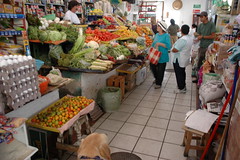When I tuned in, the show was already about halfway over. I was about to flip to another channel when I noticed that the guests were called “Freegans”. Never having heard of these types of folks before, I watched for a few minutes and here’s what I found out:
- “Freeganism” is an anti-consumerist movement where devotees reuse trash that is still useful.
- Freegans are also called “Dumpster Divers” because they fish around in the dumpsters of grocery stores to get their food!
- Grocery stores typically throw away 2-3% of their stock on a regular basis which totals in the billions of dollars in wasted food each year.
 |
| Image by colorblindPICASO via Flickr |
- Many Freegans are folks with well paying jobs who could easily afford to buy what they need new.
One married couple on the show particularly intrigued me. The guy was a doctor and his wife was a civil engineer. They were both young, somewhere in their late 20’s to early 30’s. They were certainly not short on funds to buy their food, yet their kitchen was full of cans, produce, and frozen foods that they had fished out of grocery store dumpsters.
Freegans Have the Right Idea with the Wrong Action Plan
My first impulse was to feel very sorry for this couple. They were obviously very bright and I really related to their disgust and distaste for the “gotta have it NOW” consumerism that has characterized American buying habits in recent decades.
I consider myself an anti-consumer as well, but you won’t be finding me fishing around in the dumpster of grocery stores anytime soon!
Why? Because eating this food, particularly the canned and frozen foods which seemed to make up the bulk of this young couple’s diet will make you ill and then you won’t be well enough to be an anti-consumer anymore!
What’s the point in that?
 |
| Image by Wonderlane via Flickr |
If you are going to be an anti-consumer, be an anti-consumer with PURPOSE.
Buy from small, local farms and support local businesses that contribute to your community in positive ways. Eating your food fresh and locally produced will preserve your health and keep you strong to continue promoting the causes that you believe in!
Why is local food healthier? Because it doesn’t have to be shipped long distances and is hence full of more nutrition. A conventionally produced cucumber from a local farmer’s market will have more nutrition in it than an organic cucumber from Chile. Nothing wrong with organic cucumbers from Chile, but if you happen to be on another continent, imagine how early those cukes need to be picked so they arrive on your grocery store shelf in one piece!
Organic AND local is the ideal way to go, but if that is not in the cards, then conventional and local is still better than organic shipped across the continent or the world.
Will Freeganism Last?
I empathize with the Freeganism Movement, but I just don’t have a good feeling about its chances of growing and catching on. Eating canned and frozen grocery store food as the basis of the diet is a surefire recipe for chronic illness.
Unfortunately, I think these Freegans do not realize what their future has in store for them. What they do not buy in the way of food will be made up for in spades with lots and lots of dollars spent on pharmaceuticals!
Sarah, The Healthy Home Economist








I watched a great coumentary called ‘Taste the Waste’ (http://fondalashay.com/mintchilli/recomended-documentary-taste-the-waste). They features some ‘freegans’ but i recall they were always hunting in organic bins. They were however in Germany, where there is a massive healthy food culture. So they were getting fresh produce and organic honeys and such. They were smart about it.
However, I am not going to be joining in either.. though I would love some free local honey 😛
As with most things, I think its moderation and location that determine Freeganism's success. What is available in a specific location and one's ability to balance those gleanings with other foods to create a complete and balanced diet will will make the difference between Freeganism as a viable, healthy option or the well- intentioned accidental destruction of one's health.
However, I think the best way to be a freegan is to pick fruit off trees that otherwise wouldn't get picked. We have a fruit tree project here and its awesome for hooking up tree owners and volunteers who then get to take free fruit home. Also, going to someone's house who's fruit is falling and just asking them if you could pick their fruit is great. Usually they are very appreciative. You offer to give them most of it and take what you need. Another win win. Great this time of year especially.
The freegans that I have heard about who work the dumpsters locally (Food Not Bombs) actually get a lot of produce out of the dumpsters. Stuff that is just past the desired freshness but if you skim off a few layers is fine underneath. They make soups and stews and serve them onthe street to the homeless and whoever wants a free meal. I think it's pretty awesome myself. Plus others who do it are very poor and I think it's a great way to get food when they otherwise would not. I think they probably emphasized canned foods on the show because it would gross people out to hear about them eating fresh produce that was covered in other garbage. But in the grocery markets that specialize in produce this isn't as much the case. A number of businesses are aware of this movement and actually place their produce accordingly. Cuts down on garbage costs too. Win win.
Please consider viewing the recent documentary film – DIVE! http://divethefilm.com/
I'm not a dumpster diver, but do value reducing waste and reusing and appreciate this film for a number of reasons. It seems possible, based on the film, to eat a nutrient-dense, whole food diet – the majority of the rescued food in DIVE! is fresh, whole food – meats (including free range/organic), fresh produce, yogurt, etc.
I agree, Erin. Money spent on locally produced, fresh, nutrient dense food is money WELL SPENT. It is more important than the mortgage, car payment, or even health insurance in my opinion. If you lose your health, there isn't much to build on. If you have your health, you can bounce back from any other setbacks.